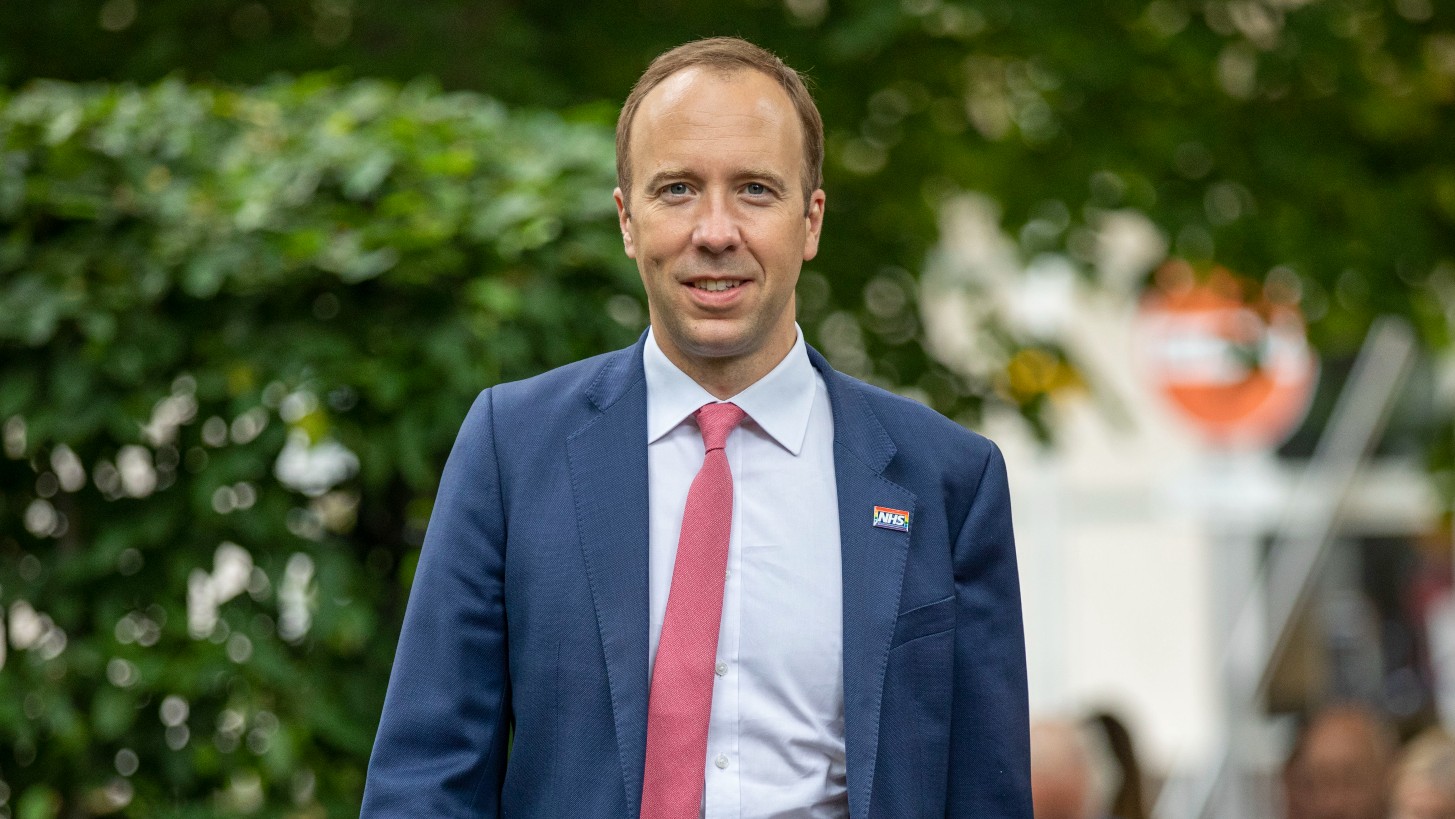Why Matt Hancock’s private life is of public interest
Media coverage of former health secretary’s affair has reawakened debate about press intrusion

A free daily email with the biggest news stories of the day – and the best features from TheWeek.com
You are now subscribed
Your newsletter sign-up was successful
Polly Rippon, a journalism teacher at the University of Sheffield, on why voters sometimes have a right to know what high-profile figures get up to behind closed doors
The Sun newspaper’s publication of images from Matt Hancock’s office inside the UK Department of Health, which appear to show the health secretary in a “steamy clinch” with a colleague, has led to his resignation. But it has also once again raised the issue of privacy from press intrusion.
Allegations regarding the health secretary’s relationship with a university friend and aide, Gina Coladangelo, were featured on the front page of the newspaper and went viral within minutes of publication online.
The Week
Escape your echo chamber. Get the facts behind the news, plus analysis from multiple perspectives.

Sign up for The Week's Free Newsletters
From our morning news briefing to a weekly Good News Newsletter, get the best of The Week delivered directly to your inbox.
From our morning news briefing to a weekly Good News Newsletter, get the best of The Week delivered directly to your inbox.
It is alleged the couple, who are both married and have children, kissed and embraced in Hancock’s office in May, breaking Covid-19 social distancing rules put in place by his own department.
Before his resignation, Hancock initially apologised in a statement, saying: “I accept that I breached the social distancing guidance in these circumstances. I have let people down and am very sorry. I remain focused on working to get the country out of this pandemic, and would be grateful for privacy for my family on this personal matter.”
The exposure of a government minister’s alleged infidelities is nothing new. In journalistic terms, the story is a great example of old fashioned, tabloid newspaper reporting. But front-page stories like this are now something of a rarity as newspapers compete to publish first online, rarely holding back true exclusives for print.
Another reason is the tightening of privacy laws.
A free daily email with the biggest news stories of the day – and the best features from TheWeek.com
How we are protected
In 2000, the Human Rights Act incorporated the European Convention on Human Rights into UK law. Article 8 covers the right to privacy, stating: “Everyone has the right to respect for his private and family life, his home and his correspondence.”
In effect, Article 8 protects everyone’s privacy from interference by “public authority”, which includes the media. This extends to extramarital relationships, and in recent years judges have become more likely to rule adulterous affairs are private matters.
The 2008 case of the late Max Mosley set an important precedent in this area of law. The former Formula 1 boss successfully sued the News of the World for breach of privacy after its expose about his participation in sadomasochistic activities with prostitutes, effectively ruling what he did in his private life was exactly that - private.
But there are exceptions. In 2010, a temporary injunction was imposed on the media, banning reporting of married Chelsea footballer John Terry’s affair with a teammate’s girlfriend. It was later lifted after a High Court judge said rumours about the affair were already in the public domain, and that Terry was more concerned about his sponsorship deals than anything else.
Had Hancock been a relatively unknown government worker who applied for an injunction against The Sun preventing it from publishing the images, he would very likely have won his case. He’d have had a “reasonable expectation of privacy”.
But he wasn’t. He was a high profile, front-bench MP, elected by members of the public and leading the country’s response to a global health crisis which has killed millions of people. Here, the media has a very useful weapon in its armoury if it can persuade the court there is a strong public interest in publishing the story. This is also backed up by the journalists’ code, which sets out stringent professional standards for ethical practices in reporting.
Codes of conduct
The Editors’ Code of Practice is set out by the Independent Press Standards Commission (IPSO), and newspapers and magazines which sign up to be regulated by IPSO (including The Sun) agree to abide by the guidelines.
The clause is similar to Article 8 in its wording, which states everyone is “entitled to respect for their private and family life”.
Editors are expected to justify intrusions into any individual’s private life without consent, but if the material complained about is already in the public domain = and there are claims the Hancock affair was being discussed in DHSC WhatsApp groups - any complaint could fail.
The code goes on to say that it is unacceptable to photograph individuals, without their consent, in public or private places where there is a “reasonable expectation of privacy”.
However, if newspaper editors can demonstrate publication both “serves” and “is proportionate to” the public interest, they can argue that public interest exceptions apply.
Among others, these exemptions include exposing serious crime or serious impropriety, protecting public health or safety, disclosing a person or organisation’s failure to comply with any obligation to which they are subject, raising or contributing to a matter of public debate - including impropriety and unethical conduct or incompetence concerning the public.
The newspaper would no doubt argue this story is very much in the public interest for several reasons:
The alleged affair has taken place on government property during working hours, calling into question Hancock’s focus while responsible for leading the government’s response to a global health crisis.
It also draws attention to the spending of taxpayers’ money on the appointment of Coladangelo to the Department of Health’s oversight board. It is alleged she was appointed by Hancock as a paid, non-executive director last September.
And uniquely to this situation, it raises the question of hypocrisy on Hancock’s part. The footage allegedly shows him breaking social distancing and mask-wearing rules with someone from another household before such lockdown rules were lifted.
Whatever happens next, one thing is for sure - the public most certainly had an interest.
This article has been updated to reflect Matt Hancock’s resignation.
Polly Rippon, university teacher in journalism, University of Sheffield
This article is republished from The Conversation under a Creative Commons licence. Read the original article
-
 Local elections 2026: where are they and who is expected to win?
Local elections 2026: where are they and who is expected to win?The Explainer Labour is braced for heavy losses and U-turn on postponing some council elections hasn’t helped the party’s prospects
-
 How corrupt is the UK?
How corrupt is the UK?The Explainer Decline in standards ‘risks becoming a defining feature of our political culture’ as Britain falls to lowest ever score on global index
-
 ICE’s facial scanning is the tip of the surveillance iceberg
ICE’s facial scanning is the tip of the surveillance icebergIN THE SPOTLIGHT Federal troops are increasingly turning to high-tech tracking tools that push the boundaries of personal privacy
-
 DOGE shared Social Security data, DOJ says
DOGE shared Social Security data, DOJ saysSpeed Read The Justice Department issued what it called ‘corrections’ on the matter
-
 The high street: Britain’s next political battleground?
The high street: Britain’s next political battleground?In the Spotlight Mass closure of shops and influx of organised crime are fuelling voter anger, and offer an opening for Reform UK
-
 Is a Reform-Tory pact becoming more likely?
Is a Reform-Tory pact becoming more likely?Today’s Big Question Nigel Farage’s party is ahead in the polls but still falls well short of a Commons majority, while Conservatives are still losing MPs to Reform
-
 Taking the low road: why the SNP is still standing strong
Taking the low road: why the SNP is still standing strongTalking Point Party is on track for a fifth consecutive victory in May’s Holyrood election, despite controversies and plummeting support
-
 'The question is what it does for the ecosystem'
'The question is what it does for the ecosystem'Instant Opinion Opinion, comment and editorials of the day


